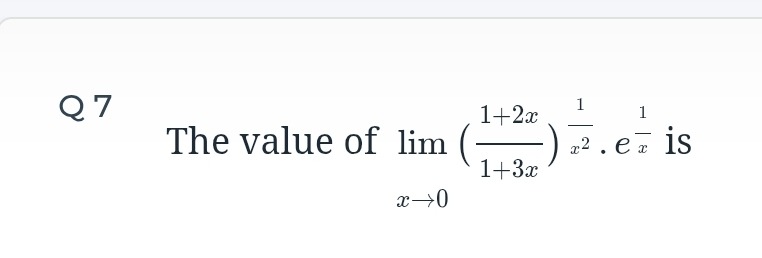Question
Question: The value of $\lim_{x\to 0} (\frac{1+2x}{1+3x})^{\frac{1}{x^2}}.e^{\frac{1}{x}}$ is...
The value of limx→0(1+3x1+2x)x21.ex1 is

Answer
e^{5/2}
Explanation
Solution
Let L=limx→0(1+3x1+2x)x21.ex1. Taking the natural logarithm of both sides: lnL=limx→0ln[(1+3x1+2x)x21.ex1] lnL=limx→0[x21ln(1+3x1+2x)+x1] lnL=limx→0[x2ln(1+2x)−ln(1+3x)+x]
Using Taylor series expansions around x=0: ln(1+u)=u−2u2+O(u3) ln(1+2x)=2x−2(2x)2+O(x3)=2x−2x2+O(x3) ln(1+3x)=3x−2(3x)2+O(x3)=3x−29x2+O(x3)
Substitute these into the numerator: Numerator =(2x−2x2)−(3x−29x2)+x+O(x3) Numerator =(2x−3x+x)+(−2x2+29x2)+O(x3) Numerator =0+25x2+O(x3)
So, lnL=limx→0x225x2+O(x3)=limx→0(25+O(x))=25. Since lnL=25, then L=e5/2.
